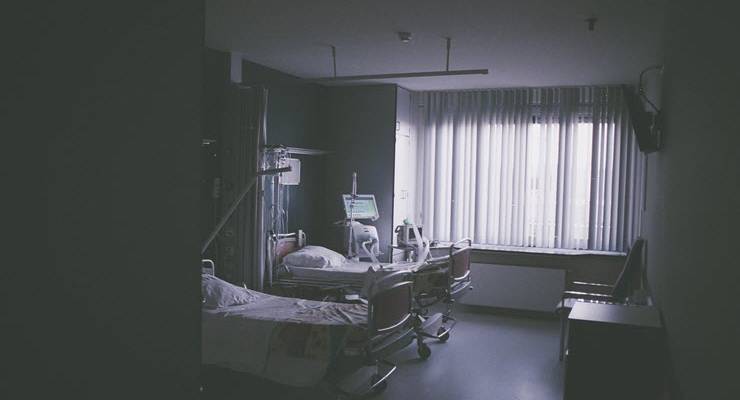
At a Queensland hospital last Wednesday, an elderly gentleman wanted to urinate. Politely, he asked the nurse for a bottle, common in hospitals and aged care homes that allow someone to go to the toilet from their bed.
The nurse told the 87-year-old that she was sorry, but there were only two of the $13 bottles for the entire public ward of the hospital. Was it possible for him to wait?
It’s only a little story, and doesn’t involve abuse or neglect or some of the other horrors that underline almost every page of the report into this nation’s care of the aged. But it goes to the heart of the public policy problem in 2021, whether it’s a state Labor government or a federal Coalition one.
Often it’s the little things that point to bigger problems. This is a big public hospital, and funding is so short that there are only two urination bottles for several people to share. The funding of our aged care — from facilities, to staff, to meals and individual care — is criminal, and Scott Morrison’s $450 million promise is just a drop in the ocean.
The royal commission has shown how home care, residential aged care, services and staff are all impacted by a system that is substandard and unsafe — an indictment on any community that claims to value its most vulnerable.
The commission’s 148 recommendations will serve as the roadmap we need to navigate a new system where our elderly are given back their dignity and allowed to live their final years with optimism and pride.
The government’s immediate promise to create a new act and commit immediate funds is welcome. But those alone won’t fix a system that is so broken that it has been the subject of a carousel of inquiries over recent decades.
What aged care needs is a heart. It needs our politicians to understand the pain of families who grapple with question after question on form after form required by aged care homes.
It needs politicians to wake up each morning wondering when their ailing parent will finally get a call that a place has been found for home care services or aged care placement.
It needs politicians to understand the empathy our aged care workers put into long days. It needs politicians to see and cry and be enraged by the lack of care afforded to some of our aged in the final years of life.
It’s easy to sit in Canberra and throw money around. But good policies comes from understanding those who are subject to them. It comes from action, not glib lines like “the inquiry we needed to have” and a commission that was a “harrowing process”. Tell us something we don’t know.
The way this has been handled is painfully familiar. Ignore the problem until you can’t any longer. Hold a review or two, maybe an inquiry. Ignore that. Promise funding, particularly if an election beckons. Pass the buck.
Being elected makes someone an MP, not an advocate for a better community. Becoming prime minister makes someone better at rising through the ranks than someone else; it doesn’t make for a good leader.
Across aged care — as well as child safety, employment, public health, crime and countless other areas — we need leadership that treats those at the centre of policy with empathy.
And denying a grandfather a $13 bottle to urinate in because our public health system can’t afford to help him shows more than a policy vacuum. It shows a lack of heart.
Have you or a family member had negative experiences with aged care? Let us know by writing to letters@crikey.com.au. Please include your full name to be considered for publication in Crikey’s Your Say section.








“..and Scott Morrison’s $450 million promise is just a drop in the ocean.”
Especially when we consider the $444,000,000 that went to the Great Barrier Reef Foundation with no application process and the $498,000,000 given to the Australian War Memorial to pull down a design award winning Anzac Hall and replace it with a war toys theme park that is absolutely out of keeping with a memorial..
Excellent points, MJM.
Yes, indeed.
My father had early onset dementia. He got in his car one day and disappeared. We didn’t know where he was, if he was alive or dead. He had driven until the car ran out of petrol and was found nearly 40 km from his home, 26 hours later. Up until that point, my mother, who was 71 at the time had been looking after Dad at home. He was beginning to get more difficult to look after and could get violent when he didn’t want to do something. So when the police found him and bought him home, with soiled clothes and no idea who we were or where he was, we made the difficult decision to find a place for him in an aged care home. We eventually found a permanent place after he spent 3 months in hospital. The home he was in was poorly staffed and the food was bad. Party pies and chips, puréed vegetables and meat, spaghetti bolognese that was inedible. He was in a dementia ward with about 30 other people. He would sit in a chair for most of the day, there was no garden, just a concrete area with some planters with dead plants in them. He spent his days in the ‘lounge’ with the other residents watching Andre Rieu videos and basically vegetating. Some of the staff were amazing, I cannot imagine how difficult a job it would be. But it became clear that most of the residents were being heavily medicated, including my father, as there was
usually only 1 staff member present most of the time. As Dad had other medical issues, he passed away in hospital from heart failure when he was admitted with pneumonia. We are thankful that he only had to spend 12 months in care as most people with Dementia often live with the disease for a decade or more. As a society we place little value on the elderly, we provide little respite for those who try to look after their loved ones at home, and we pay those who work in aged care so poorly, that we wonder why good people only last short periods of time in a high stress environment. $450 million won’t fix this shit fight. The whole system needs to be changed. It cannot be run by private business who only see profit for their shareholders, over the human beings who are in their care.
Jesus wept!
Sounds familiar, pretty much most of the centre’s are like this. Even without dementia it is a pretty frightful experience. I certainly never want to end up in one.
Andre Rieu videos, a particularly cruel and inhuman punishment.
“Practice for Purgatory.”
The problem will remain while people are able to take obscene levels of profit out of the system. When aged care operators can feed the residents slop and get enough money out of their chain of nursing homes to buy their trophy wife a Maserati then that’s where the issue lays. Every dollar in should go on care and facilities, and there should be $0.00 left over.
I think this is the point. As long as the homes are run for profit it does not matter how much money the government puts in. If the government gives the homes more money, they just get sold for a higher price to the next owner who must cut costs to make a profit.
It would seem that the “not for profit ” homes run by the churches do a very much better job – every dollar stays!
True – but I still wouldn’t want to go there!
Not the one my father was in.
Ah yes, you mean homes like Dorothy Hendersen Lodge run by the Happy Clappy Bappies. or Newmarch House run by Anglicare, or St Basil’s run by the Greek Orthodox Church. Which were all ravaged by COVID. They might have zero profit (I’ll bet some have a “surplus” though), but many are still appalling.
Creative accountants always available to show less profit for aged care homes. I’m cynical and pessimistic.
I watched Scummo on the news this morning, tears brimming in his eyes as he spoke about the aged care debacle and I was almost physically ill.Is there no end to this individual’s pozturing and hypocrisy?
A recent illness found me in the Frankston Public hospital. Short staffed, and non too clean I’m lucky I’m a fit and independent 75 year old.
I observed a great deal of cruel and harsh treatment of the elderly. Only one example: An elderly ESL lady being bullied over bed pans and her screaming during attempts to find a good vein for blood tests. Told that she must get up to “poo”. (She had a blocked bowel and serious infection.) it’s uncertain that she understood. But nobody cared.
At the shift change I pointed out to the new nurse, if someone could sit and hold her hand while trying to take blood I’m sure she would be calmer. The nurse listened and did as I suggested (just once). It was a success. The lady remained calm and cooperative instead of screaming and refusing.
Time spent, five minutes.
ESL, just lonely, feelings of helplessness and pain require very little time and are at the heart of good Age Care.
I also experienced impatience and rough handling. But I’m lucky. I can firmly point out that they must stop, listen, and point out that a particular procedure was hurting me.
My cannula was leaking blood and saline. It had soaked my bedding while I slept.
Overwrought or just lack of care, the nurse grabbed my hand. I firmly said “stop!”. She let go and put her hands up in false surrender. I demonstrated the careful removal of the bandage. I then eased off the edge of the waterproof dressing so she could grip it. I then instructed her to remove it “CAREFULLY” while I put pressure on the cannula and bloody mess. Had I not been fit, strong willed and confident I could have finished up like the ESL lady opposite me. Helpless and frightened.
We don’t need to throw more and more money at age care. We need a culture change where staff are constant and familiar face. Empathy and understanding is essential for those who are weaker or vulnerable.
Name: Jacqueline Wilson-Wilde
Email: Jacquiwilsonwilde@icloud.com
Phone: 0491386927
Safety Beach, Victoria.
Hospitals are short funded as well.